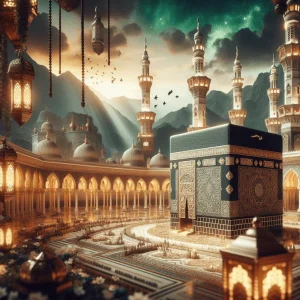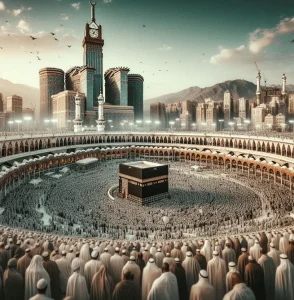Table of Contents
Discover the spiritual significance of the Day of Arafah, its historical roots, and the modern observance. The Day of Arafah, often referred to simply as Arafah, stands as a momentous milestone in the Islamic calendar, carrying profound spiritual significance for Muslims around the world. Falling on the 9th day of Dhul-Hijjah, the twelfth and final month of the Islamic lunar calendar, it is inexorably linked to the annual Hajj pilgrimage to Mecca, the holiest city in Islam. However, its significance transcends the boundaries of the holy pilgrimage, touching the hearts and souls of all Muslims, regardless of their physical proximity to the sacred sites.

The Day of Arafah finds its roots deeply intertwined with the grand tapestry of Islamic history, tracing back to the era of the revered Prophet Ibrahim (Abraham) and his devoted son Prophet Isma’il (Ishmael). It is here, on the plains of Arafat, where Prophet Ibrahim’s unwavering faith and submission to the divine will were tested and affirmed. This historical backdrop underscores the Day of Arafah’s unique place in the hearts of believers, as it serves as a powerful reminder of the virtues of humility, faith, and unwavering commitment to Allah’s guidance.
In the modern era, the Day of Arafah continues to reverberate with spiritual significance, even for those who are not embarking on the Hajj pilgrimage. Muslims worldwide eagerly anticipate this day as an opportunity for fasting, prayer, and introspection. It is a day when the heavens are believed to open wide, and Allah’s boundless mercy showers upon those who sincerely seek forgiveness and guidance. The rituals performed on Arafah resonate with deep symbolism, reflecting the unity of the Muslim Ummah (community) and the interconnectedness of all believers.
In this comprehensive guide, we embark on a journey to uncover the multifaceted layers of the Day of Arafah. We will delve into its historical roots, exploring the sacred narratives that have shaped its significance over the centuries. We will examine the spiritual dimensions of Arafah, emphasizing the concept of forgiveness that lies at its core. Additionally, we will meticulously dissect the rituals associated with Arafah, from the solemn act of standing on the plains to the profound moments of supplication and reflection.
Furthermore, we will shed light on how the Day of Arafah is observed in the modern age. While intrinsically linked to the Hajj pilgrimage, this day is not limited to the boundaries of Mecca. Muslims from all corners of the globe, whether they are pilgrims or not, eagerly participate in the fast, engage in extra prayers, and seek forgiveness with utmost devotion.
As we embark on this journey to unravel the significance of the Day of Arafah, we invite you to join us in exploring this sacred day’s rich tapestry, its historical significance, rituals, and contemporary observance. Together, we will discover the enduring power of faith, unity, and forgiveness that the Day of Arafah represents, touching the hearts of believers and illuminating the path of righteousness.
Day of Arafah: A Historical Perspective
To truly appreciate the significance of the Day of Arafah, we must journey back through the annals of history to a time when faith and devotion were tested and affirmed on the very plains where countless pilgrims now stand. It is a history steeped in reverence, a history that intertwines the narratives of prophets and their unwavering commitment to the divine.
The Prophetic Connection
The historical roots of the Day of Arafah are firmly anchored in the life and times of the revered Prophet Ibrahim (Abraham) and his beloved son, Prophet Isma’il (Ishmael). According to Islamic tradition, it was Ibrahim who received a divine command from Allah to construct the Kaaba, the sacred cubic structure located within the Masjid al-Haram in Mecca.
As Ibrahim embarked on this monumental task, accompanied by his dutiful son Isma’il, their unwavering faith in Allah’s command was put to the ultimate test. Tradition holds that upon completion of the Kaaba’s construction, Allah summoned Ibrahim to sacrifice his son as a testament to his unwavering devotion. Remarkably, both father and son willingly submitted to the divine will, demonstrating unparalleled obedience and faith.
The Plains of Arafat
The connection between this historical narrative and the Day of Arafah is woven into the very fabric of Arafat’s landscape. It is believed that during this profound test of faith, Prophet Ibrahim stood on the plains of Arafat, seeking Allah’s guidance and forgiveness. These very plains, where his devotion and submission were affirmed, have become the focal point of the Day of Arafah’s rituals.
The act of standing at Arafah during the Hajj pilgrimage symbolizes not only the congregation of humanity on the Day of Judgment but also the emulation of Ibrahim’s unwavering faith and humility. It is a moment when pilgrims, like Ibrahim before them, stand before the Almighty, supplicating for forgiveness and guidance.
The Continuity of Faith
The historical significance of Arafah extends beyond the narrative of Ibrahim and Isma’il. It represents a continuum of faith, a thread that connects the faithful across generations. Muslims who embark on the Hajj pilgrimage today are, in essence, retracing the steps of Ibrahim, reliving his devotion, and reaffirming their own commitment to Allah’s command.
As the sun sets on the plains of Arafat each year, it serves as a poignant reminder of the enduring power of faith and submission to the divine will. It is a history that lives on in the hearts and souls of the pilgrims who gather here, as they too stand in prayer, seeking Allah’s forgiveness and guidance, just as Ibrahim did millennia ago.
In essence, the historical perspective of the Day of Arafah is a testament to the timeless nature of faith and devotion. It is a bridge that spans the centuries, connecting the faithful to the profound acts of devotion and sacrifice that have defined the essence of Islam. As we explore the rituals and significance of Arafah, we do so with a deep appreciation for the historical narrative that underpins this sacred day, recognizing that we are all part of a continuum of faith that stretches back to the very origins of Islam.
The Spiritual Significance of Arafah
The Day of Arafah, often referred to as the “Day of Forgiveness,” holds a unique and profound place in the hearts of Muslims worldwide. Beyond its historical roots and rituals, Arafah’s spiritual significance is what truly elevates it to a sacred and transformative day.
A Day of Redemption and Forgiveness
At the heart of Arafah’s spiritual significance lies the belief that it is a day when Allah’s mercy and forgiveness flow abundantly. It is a day when the gates of heaven are wide open, and supplications made with sincerity are readily accepted. Muslims believe that on this day, Allah forgives the sins of those who turn to Him with genuine repentance.
The act of fasting on the Day of Arafah is seen as a means of expiating sins. It is a powerful opportunity for Muslims to cleanse their souls, seek redemption, and turn away from past transgressions. This act of fasting is not merely an abstention from food and drink; it is a symbolic commitment to a life of righteousness and piety.
A Time for Personal Reflection
Arafah is also a day for deep introspection and self-reflection. It is a time when Muslims are encouraged to assess their actions, seek self-improvement, and make sincere resolutions for the future. It serves as a mirror, reflecting one’s deeds and shortcomings, while also offering the hope of transformation and renewal.
As pilgrims stand on the plains of Arafat, they engage in personal supplication, pouring out their hearts to Allah. This act of devotion is deeply personal, allowing individuals to connect with their Creator on an intimate level. It is a moment to lay bare one’s hopes, fears, and desires, seeking Allah’s guidance and blessings.
A Reminder of Allah’s Boundless Mercy
The concept of forgiveness is central to Arafah, serving as a powerful reminder of Allah’s boundless mercy and compassion. It reinforces the belief that, no matter how far one may have strayed, the path to redemption and forgiveness is always open. This assurance of divine forgiveness brings solace and hope to the hearts of believers.
The Day of Arafah emphasizes the notion that Allah’s mercy surpasses His wrath, and that sincere repentance can wash away the stains of sin. It instills a sense of humility, gratitude, and reliance on the benevolence of the Almighty.
In essence, the spiritual significance of Arafah transcends rituals and tradition. It touches the deepest recesses of the human soul, inviting believers to shed the burdens of their past and embrace the promise of a renewed spiritual journey. It is a day when hearts are cleansed, sins are forgiven, and the connection between the Creator and the created is reaffirmed.
The Rituals of Arafah
The Day of Arafah is a day of profound significance in the Islamic calendar, and its rituals are at the heart of the experience for pilgrims embarking on the Hajj pilgrimage. These rituals are a testament to the unity, devotion, and submission of Muslims to Allah, and they hold deep spiritual meaning.
1. The Standing at Arafah
The central and most significant ritual of the Day of Arafah is the act of standing at Arafat. Pilgrims gather on the vast plains of Arafat, wearing simple white garments known as ihram, symbolizing purity and equality. This gathering is a symbolic representation of the Day of Judgment when all of humanity will stand before Allah, regardless of their worldly status.
Pilgrims spend the entire day in earnest supplication, reciting prayers, and seeking Allah’s guidance. The act of standing signifies humility before the Creator and serves as a powerful reminder of the transient nature of life. It is a moment when pilgrims collectively acknowledge their dependence on Allah’s mercy and seek His forgiveness.
2. Supplication and Reflection
A significant part of the Day of Arafah is dedicated to personal reflection and heartfelt supplication. Pilgrims pour out their hearts in prayer, beseeching Allah for forgiveness, guidance, and blessings for themselves, their families, and the entire Ummah (Muslim community). It is a time for self-assessment, repentance, and the renewal of faith.
The emotional intensity of this moment is palpable as pilgrims reflect on their lives, their deeds, and their relationship with Allah. The plains of Arafat echo with the sincere cries and pleas of believers from diverse backgrounds, all united in their devotion to the Almighty.
3. The Noon Prayer
On the Day of Arafah, the noon prayer (Dhuhr) is performed at Arafat, led by the Imam (prayer leader) of the Grand Mosque in Mecca. This congregational prayer symbolizes the unity of the global Muslim community, regardless of nationality, ethnicity, or social status. It serves as a powerful reminder of the collective bond that unites all Muslims in worship.
4. Departure to Muzdalifah
After sunset, as the Day of Arafah draws to a close, pilgrims leave Arafat for Muzdalifah, another significant location in the Hajj pilgrimage. Here, they engage in further prayers and collect pebbles for the upcoming Stoning of the Devil ritual. The journey to Muzdalifah represents a transition from the intensity of Arafat to a more contemplative and peaceful setting.
These rituals of Arafah are not merely acts of tradition; they are profound expressions of faith, submission, and unity. They serve as a reminder of the transient nature of life, the importance of humility, and the significance of seeking Allah’s guidance and forgiveness. Whether standing on the plains of Arafat or praying from afar, Muslims all over the world are connected by the shared experience of these rituals on the Day of Arafah, reaffirming their faith and devotion to the divine.
Modern Observance of the Day of Arafah
While the Day of Arafah is inherently linked to the annual Hajj pilgrimage and the millions of pilgrims who converge on the plains of Arafat in Mecca, its spiritual resonance extends far beyond those hallowed grounds. In the modern age, Muslims around the world eagerly anticipate this sacred day, recognizing it as an opportunity to partake in its blessings, regardless of whether they are physically present in Mecca.
Fasting and Spiritual Reflection
One of the most widely observed practices on the Day of Arafah is fasting. Fasting on this day is not exclusive to Hajj pilgrims; it is a recommended practice for all Muslims, irrespective of their location. Believers fast from dawn until sunset, emulating the actions of the pilgrims in Mecca. This act of fasting is seen as a way to purify the soul, seek forgiveness for past sins, and draw closer to Allah.
For those not performing the Hajj, the Day of Arafah becomes a time of heightened devotion and spiritual reflection. Muslims use this occasion to engage in extra acts of worship, such as recitation of the Quran, increased prayers, and charitable deeds. The day provides an opportunity to recalibrate one’s spiritual compass and reaffirm faith and commitment to the divine.
Seeking Forgiveness and Making Du’a (Supplication)
The Day of Arafah is synonymous with earnest supplication and heartfelt prayers. Muslims around the world use this special day to seek Allah’s forgiveness for their past transgressions and to pray for guidance, blessings, and peace for themselves, their families, and the entire Ummah. The belief that Allah’s mercy is especially abundant on this day fuels the fervor of these supplications.
Whether in the solitude of their homes, at local mosques, or even at work, Muslims take time to engage in personal du’a, pouring out their hearts to Allah. It is a day when the barriers between the individual and the divine seem to dissolve, and the supplicant feels a deep connection with the Creator.
Acts of Charity and Kindness
In addition to personal acts of devotion, the Day of Arafah inspires Muslims to engage in acts of charity and kindness. It is a day when generosity and compassion are amplified, with many individuals and organizations launching initiatives to help those in need. From distributing food to the less fortunate to contributing to charitable causes, Muslims are encouraged to extend their benevolence to others on this auspicious day.
Global Unity in Worship
The modern observance of the Day of Arafah is a testament to the global unity of the Muslim Ummah. Muslims from diverse cultures, languages, and backgrounds come together in worship, all connected by their shared devotion to Allah. In this digital age, technology enables Muslims to follow the events of Arafah in real-time, fostering a sense of spiritual closeness to the pilgrims in Mecca.
The modern observance of the Day of Arafah is a manifestation of the universal and timeless nature of Islamic faith. It transcends geographical boundaries, bringing Muslims from around the world together in devotion, supplication, and acts of kindness. Whether standing on the plains of Arafat or participating from afar, Muslims find solace, hope, and spiritual rejuvenation on this sacred day, reaffirming their commitment to the path of righteousness and the worship of the one true Allah.
The Day of Arafah FAQs
What is the significance of fasting on the Day of Arafah?
Fasting on the Day of Arafah is highly significant in Islam. It is believed that this fast expiates the sins of the past year and the year to come. The Prophet Muhammad (peace be upon him) said, “Fasting on the Day of Arafah expiates the sins of the previous year and the coming year.” (Sahih Muslim) This act of fasting is a means of purification, forgiveness, and drawing closer to Allah. Even for those not on Hajj, fasting on this day is a way to share in the blessings and spiritual benefits of Arafah.
Can non-pilgrims visit Arafat on the Day of Arafah?
Arafat is primarily reserved for Hajj pilgrims. However, non-pilgrims are encouraged to fast, pray, and seek forgiveness on this auspicious day from their respective locations. While the physical journey to Arafat may not be possible for everyone, the spiritual journey of the heart and soul can be undertaken from anywhere in the world. Engaging in acts of worship, supplication, and reflection on this day is highly encouraged.
How does the Day of Arafah foster unity among Muslims?
The Day of Arafah fosters unity among Muslims in multiple ways. Firstly, it is a day when Muslims from diverse backgrounds, cultures, and nationalities gather on the plains of Arafat as equals, dressed in the same simple white garments of ihram. This physical unity symbolizes the spiritual unity of the Muslim Ummah. Secondly, Muslims worldwide, whether on Hajj or not, engage in similar acts of devotion on this day, such as fasting and supplication. It reinforces the sense of brotherhood and unity among Muslims, transcending geographical and cultural differences.
What should one pray for on the Day of Arafah?
On the Day of Arafah, Muslims are encouraged to pray for various blessings and guidance. They can pray for forgiveness of their sins, guidance in their personal and spiritual lives, blessings for themselves and their families, and peace and prosperity for the entire Ummah. It is a day for sincere supplication, and Muslims are encouraged to pour out their hearts to Allah, seeking His mercy and benevolence.
Is there a specific time for supplication on Arafah?
While the entire day of Arafah is considered auspicious for supplication, the time between Dhuhr (noon) and Maghrib (sunset) is considered especially significant. This period is when the Prophet Muhammad (peace be upon him) stood at Arafat, delivering his Farewell Sermon and engaging in intense supplication. Muslims often seize this time to offer their heartfelt prayers and seek Allah’s forgiveness and blessings.
How can I make the most of the Day of Arafah?
To make the most of the Day of Arafah, engage in sincere worship, seek forgiveness, perform acts of kindness, and reflect on your spiritual journey. Begin by fasting if you are not on Hajj, as it is one of the most virtuous acts on this day. Dedicate time to personal supplication, reflecting on your life’s journey, and making resolutions for self-improvement. Engage in acts of charity, helping those in need, and spreading kindness. Most importantly, approach the day with humility, sincerity, and a deep sense of devotion to Allah.
The Day of Arafah is a day of profound significance and blessings. These FAQs shed light on its importance and provide guidance on how Muslims can observe and benefit from this sacred day, whether they are on the holy pilgrimage or not.





More Stories
Experience the Incredible Serenity of Worship by Following Key Umrah Rules
Experience the Powerful Serenity of a Memorable Trip to Umrah
The Essential Guide to Umrah Visa Fee from USA Made Easy